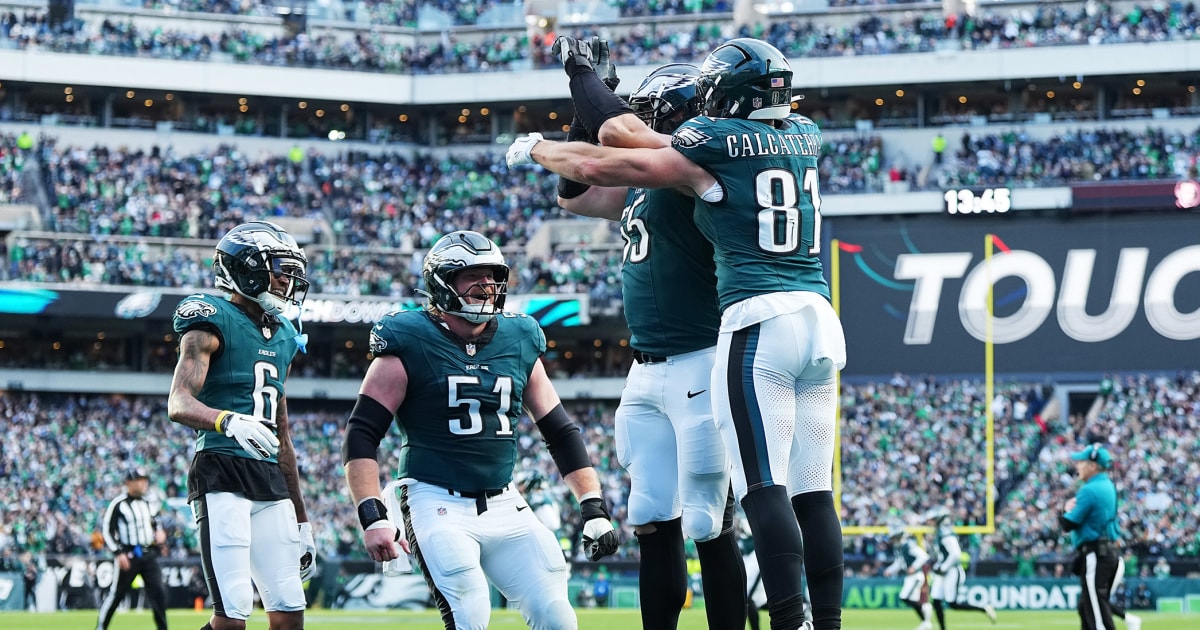Opinion | This staggering bet on the Eagles exposes a major flaw in sports betting

A Kentucky sports bettor may have taken a few years off his life on Sunday after placing a historic bet on the Philadelphia Eagles. The unnamed individual wagered a staggering $3.1 million on the Eagles to beat the Carolina Panthers on the money line. Despite an uneven offensive performance and several lead changes, the Eagles held on to beat the Panthers, 22-16. The win paid out a little over $440,000.
For those unfamiliar, Money Line Bet is a wager where you are picking the winner of the game outright. No point spreads. Just winners. The odds for each team are posted in terms of potential payouts, based on a $100 wager for favorites and underdogs.
It’s a record-breaking risk to spend $3.1 million to win just over $440,000. This is the antithesis of a value bet.
In this case, the Eagles were a -700 favorite. This means that in order to win $100 on the Eagles, you’d have to bet $700. For most gamblers this is a huge risk for little reward, even when you’re just talking about $700 for $100. It’s a record-breaking risk to spend $3.1 million to win just over $440,000. This is the antithesis of a value bet. And herein lies the problem.
While sports betting is currently legal in 38 states and the District of Columbia, sports betting education remains hard to come by. And spare me on the pamphlet that might exist on the counter of your local casino sportsbook. Nobody is looking at those. But they are grabbing the latest NFL or college football teasers sitting right next to it.
Indeed, these days, you can look at just about any sports media outlet (and a good number of nonsports specific sites, too) and find an endless parade of sports betting analysts, sports betting sponsors and segments geared toward who to pick and who not to pick. But these same sites are almost never interested in pieces on sports-betting education. Casual sports bettors make up the majority of gamblers. Bad sports betting habits beget bad sports betting habits.
The arguably fun but inarguably high-risk parlay-style bets give the house the edge, even as they can seem like you’re wagering less to potentially gain more. This false perception is especially dangerous for novices. That’s not my opinion — it’s literally statistics. And yet sports better sites like Fanduel and Draftkings spoon feed parlays to betters with special deals and enticing combinations.
As part of the legalization of sports betting, don’t we as a sports media (of which I am part of) owe it to casual sports bettors to point them in the best direction possible when it comes to where they wager their money? The stock world has Bloomberg or CNBC. What do we have for sports betting? Sports betting has been equated to the stock market. But we don’t have nearly the education for sports betting that we do when it comes to buying and selling stocks.
As the host of a daily sports-television show, I often find stories celebrating big wins on 10-team parlays or guys like “Mattress Mack” wagering seven figures on the Astros to win in the postseason. What you don’t hear about is the estimated 96% or 97% of regular sports bettors that fail to turn a profit. I live in Las Vegas. It’s the reason these giant structures filled with slot machines and sports book exists. The books almost never lose.
Simply telling people to call 1-800 GAMBLER if they have a gambling problem isn’t enough.
Sports betting is the next frontier for those trying to make some quick cash. Simply telling people to call 1-800 GAMBLER if they have a gambling problem isn’t enough.
Maybe it’s time to get the Federal Communications Commission get involved. If sports networks are going to bombard viewers and listeners with sports betting offers designed to get you hooked on trying your hand as a handicapper, maybe they should be required to provide some sort of accompanying sports betting education. Earlier I mentioned that teasing and parlays are not a good long-term strategy to grow your betting bankroll. That’s because you are decreasing your odds with each subsequent bet that you need to be successful with. Figure out a ratio of sports betting content to education that makes sense and make it a requirement.
There is one potential bright spot when it comes to bettors becoming smarter with the ability to gain an edge against “the house.” Artificial intelligence may eventually level the playing field with predictive analytics. Until then, sports bettors would be wise to take a slow and steady approach. I’m not saying we need to figure out how to break the sports books, but let’s at least try to even the odds.
Related
I became a millionaire in my 20s but my sports…
Millions wagered, hundreds of thousands in debt and a pending divorce.Joe C, a native of Chicago, fell into the depths of addictive sports gambling at the age o
Strip executive retiring after 3 decades with gambling giant MGM…
A top executive who oversees multiple properties on the Strip, including one of Las Vegas Boulevard’s most recognizable and successful casino-hotels, is
Danish Government’s Success with Gambling Addiction
Gambling addiction is a growing concern worldwide, with many countries struggling to find effective ways to regulate the industry. Denmark, however, has e
UFC 313 Gambling Preview: Will Magomed Ankalaev end Alex Pereira’s…
Alex Pereira is back! On Saturday, Pereira puts his light heavyweight title on the line against Magomed Ankalaev in the main event of UFC 313. Before that, J












